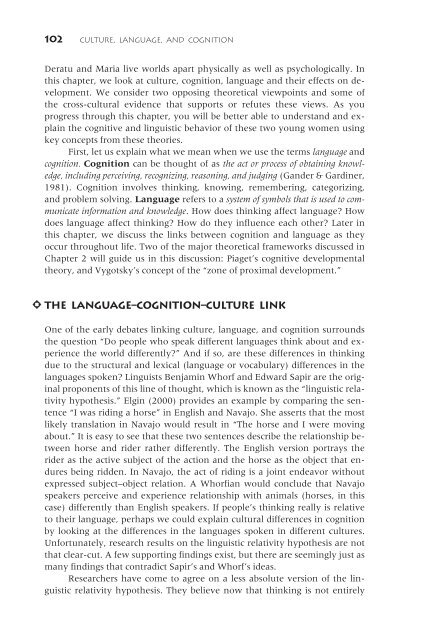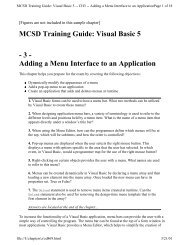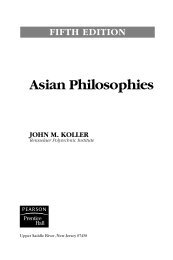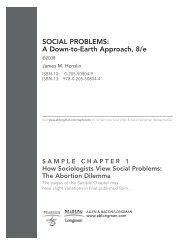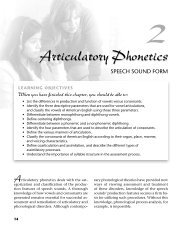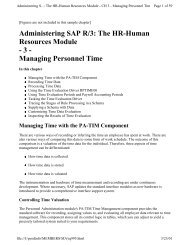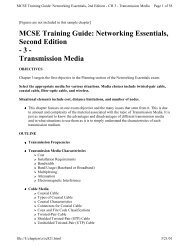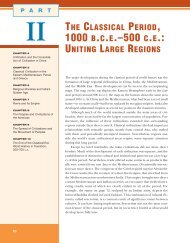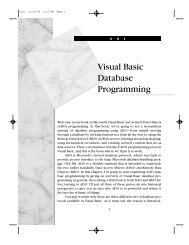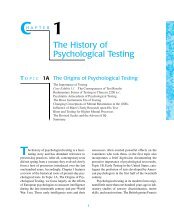CULTURE, language, AND COGNITION
CULTURE, language, AND COGNITION
CULTURE, language, AND COGNITION
You also want an ePaper? Increase the reach of your titles
YUMPU automatically turns print PDFs into web optimized ePapers that Google loves.
GA305c05.qxd 4/30/2004 11:26 AM Page 102<br />
102 culture, Language, and cognition<br />
Deratu and Maria live worlds apart physically as well as psychologically. In<br />
this chapter, we look at culture, cognition, <strong>language</strong> and their effects on development.<br />
We consider two opposing theoretical viewpoints and some of<br />
the cross-cultural evidence that supports or refutes these views. As you<br />
progress through this chapter, you will be better able to understand and explain<br />
the cognitive and linguistic behavior of these two young women using<br />
key concepts from these theories.<br />
First, let us explain what we mean when we use the terms <strong>language</strong> and<br />
cognition. Cognition can be thought of as the act or process of obtaining knowledge,<br />
including perceiving, recognizing, reasoning, and judging (Gander & Gardiner,<br />
1981). Cognition involves thinking, knowing, remembering, categorizing,<br />
and problem solving. Language refers to a system of symbols that is used to communicate<br />
information and knowledge. How does thinking affect <strong>language</strong>? How<br />
does <strong>language</strong> affect thinking? How do they influence each other? Later in<br />
this chapter, we discuss the links between cognition and <strong>language</strong> as they<br />
occur throughout life. Two of the major theoretical frameworks discussed in<br />
Chapter 2 will guide us in this discussion: Piaget’s cognitive developmental<br />
theory, and Vygotsky’s concept of the “zone of proximal development.”<br />
�� THE LANGUAGE–<strong>COGNITION</strong>–<strong>CULTURE</strong> LINK<br />
One of the early debates linking culture, <strong>language</strong>, and cognition surrounds<br />
the question “Do people who speak different <strong>language</strong>s think about and experience<br />
the world differently?” And if so, are these differences in thinking<br />
due to the structural and lexical (<strong>language</strong> or vocabulary) differences in the<br />
<strong>language</strong>s spoken? Linguists Benjamin Whorf and Edward Sapir are the original<br />
proponents of this line of thought, which is known as the “linguistic relativity<br />
hypothesis.” Elgin (2000) provides an example by comparing the sentence<br />
“I was riding a horse” in English and Navajo. She asserts that the most<br />
likely translation in Navajo would result in “The horse and I were moving<br />
about.” It is easy to see that these two sentences describe the relationship between<br />
horse and rider rather differently. The English version portrays the<br />
rider as the active subject of the action and the horse as the object that endures<br />
being ridden. In Navajo, the act of riding is a joint endeavor without<br />
expressed subject–object relation. A Whorfian would conclude that Navajo<br />
speakers perceive and experience relationship with animals (horses, in this<br />
case) differently than English speakers. If people’s thinking really is relative<br />
to their <strong>language</strong>, perhaps we could explain cultural differences in cognition<br />
by looking at the differences in the <strong>language</strong>s spoken in different cultures.<br />
Unfortunately, research results on the linguistic relativity hypothesis are not<br />
that clear-cut. A few supporting findings exist, but there are seemingly just as<br />
many findings that contradict Sapir’s and Whorf’s ideas.<br />
Researchers have come to agree on a less absolute version of the linguistic<br />
relativity hypothesis. They believe now that thinking is not entirely


